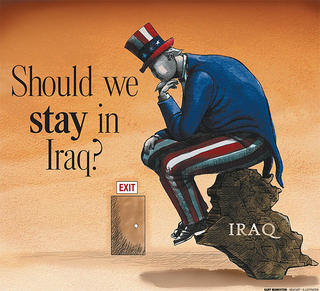FOCUS | Corruption Hobbles the Rebuilding of Iraq


Even in Iraqi City Cited as Model,
Rebuilding Efforts Are Hobbled
By CRAIG S. SMITH
Published: September 18, 2005
NAJAF, Iraq - In April, Najaf's main maternity hospital received rare good news: an $8 million refurbishment program financed by the United States would begin immediately. But five months and millions of dollars later, the hospital administrators say they have little but frustration to show for it.
They keep saying there's renovation but, frankly, we don't see it," said Liqaa al-Yassin, director of the hospital, her exasperated face framed by a black hijab, or scarf. "Each day I sign in 80 workers, and sometimes I see them, sometimes I don't."
She walks a visitor through the hospital's hot, dim halls, the peeling linoleum on the floors stained by the thousands of lighted cigarettes crushed underfoot. Anxious women, draped in black head-to-foot chadors, or veils, sit in the sultry rooms fanning their sick children.
"My child has heart problems, she can't take this heat," pleaded one mother as Dr. Yassin walked past.
The United States has poured more than $200 million into reconstruction projects in this city, part of the $10 billion it has spent to rebuild Iraq. Najaf is widely cited by the military as one of the success stories in that effort, but American officers involved in the rebuilding say that reconstruction projects here, as elsewhere in the country, are hobbled by poor planning, corrupt contractors and a lack of continuity among the rotating coalition officers charged with overseeing the spending.
"This country is filled with projects that were never completed or were completed and have never been used," said a frustrated civil affairs officer who asked not to be identified because he had not been cleared to speak about the reconstruction.
Najaf would seem to be one of Iraq's most promising places to rebuild. As a Shiite holy place, it has few Sunnis and, as a result, none of the insurgent attacks and sabotage that plague other parts of the country. Just a year after fighting between American forces and Shiite militias left much of the city in smoking ruins, a new police force is patrolling the streets and security in the city has been handed over to Iraqis.
There are some successes. The Army Corps of Engineers has finished refurbishing several police and fire stations, one of which has shiny new fire engines donated by Japan. It is spending tens of thousands of dollars to refurbish crumbling schools and has replaced aging clay water pipes in the suburb of Kufa with more durable plastic ones. It is even spending half a million dollars to renovate the city's soccer stadium, putting in new lights and laying fresh sod.
But in a series of interviews, American military officers and Iraqi officials involved in the reconstruction described a pattern of failures and frustrations that Army officers who have worked in other parts of Iraq say are routine. Residents complain that the many of the city's critical needs remain unfulfilled and the Army concedes that many projects it has financed are far behind schedule. Officers with the American military say that corruption and poor oversight are largely to blame.
"We were told to stimulate the economy any way we can, and a lot of money was wasted in the process," said Capt. Kelly Mims, part of the Army liaison team that maintains an office in Najaf's local government building. "Now we're focused on spending the money more wisely."
He said the Army was forming a committee with provincial authorities to create a master list of all current and future projects so that the money goes where it is most needed.
Several agencies are charged with reconstruction in Iraq. In Najaf it is primarily the work of the Army Corps of Engineers and the United States Agency for International Development.
They award some projects to foreign contractors, many of them American companies that hold master contracts for reconstruction work. Other projects are awarded directly to Iraqi companies, but even the American companies subcontract much of the work to Iraqis. A handful of Army reservists and civilian employees hand out cash to Iraqi contractors and try to keep track of the projects they underwrite.
But American officers say there is almost no oversight after a contractor is given the job. The Army pays small Iraqi contractors in installments - 10 percent at the outset, 40 percent when the work is half done, 40 percent on completion and the final 10 percent after fixing problems identified in a final inspection. On larger projects, contractors are paid by the month, regardless of how much work is actually done.
Penalty clauses for missing deadlines are rare, and some contractors drag out their projects for months, officers say, then demand more money and threaten to walk away if it is not forthcoming.
">1 2 3 Next Page >
Link Here




0 Comments:
Post a Comment
<< Home